

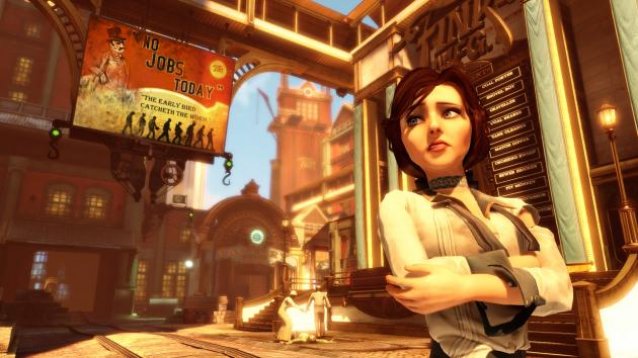
Courtnee Draper has been acting professionally since childhood, so it is no wonder she was chosen by Ken Levine and Irrational Games to play one of the most intriguing and iconic video game characters of this generation, the “Lamb of Columbia,” Elizabeth Comstock. Courtnee’s lilting, mellifluous voice lent a quality to the dimension-hopping Elizabeth that is hard to quantify: at times, childlike and full of wonder and at other times, somber and distraught. It is a masterful performance, second only to Jennifer Hale’s turn as the female Commander Shepard (“FemShep”) in the Mass Effect series of games.
Put simply, Elizabeth/Courtnee is the heart and soul of the complex masterpiece that is Bioshock Infinite.
The lovely Ms. Draper was kind enough to take a break from her hectic schedule to answer a few questions about Bioshock Infinite, her performance and her life in general.
Jerry Bonner: What, to you, was the coolest and/or most interesting thing about playing Elizabeth?
 Courtnee Draper: The coolest thing for me was—I don’t know—it’s hard to narrow it down to just one thing. I really liked being exposed to a completely different medium and the learning curve in doing a game was very sharp. I wasn’t very familiar with the current video games, so learning all of that in the last two and half years has been really amazing.
Courtnee Draper: The coolest thing for me was—I don’t know—it’s hard to narrow it down to just one thing. I really liked being exposed to a completely different medium and the learning curve in doing a game was very sharp. I wasn’t very familiar with the current video games, so learning all of that in the last two and half years has been really amazing.
The creativity and the intellect that goes into making games is mind boggling. It’s really nice to be in that world now and have such and understanding and appreciation that I didn’t have before, so that was really cool. And, of course, working with Ken (Levine, Irrational Games Creative Director) is dream come true. I mean, he’s amazing. He really, really is a genius and the things he was trying to do and accomplish. I was just very impressed with his dedication to that. Even in the face of people questioning him or saying, “You’re crazy; that’s not going to work!” he still persevered, and I think anytime you get a chance to work with someone like that, whether you are in an artistic field or not, I think it’s amazing to work with someone like that. Especially in such a collaborative way like we did with Bioshock Infinite.
So, I think those are the most interesting things I took away from being Elizabeth. And now that that the game is out, seeing the fan reaction and hearing that all the things we were trying to do with this game really resonating with them (the fans) and the critics, and the industry as a whole, is really just phenomenal . You really can’t ask for anything more than that!
JB: How hands on was Ken (Levine) during the recording of the dialogue?
CD: He was always there, which I think is pretty typical for a director, producer or writer to be guiding the performance and the recordings. He was more hands on in the fact that he was always there in the room with us, which is very unique because a lot of times you’re in a recording studio and you’re talking to someone across the world on Skype giving direction. I just did something where they (the producers) were Skyping in from Poland! Ken was right there in the room with us giving direction. So, he was hands on in that aspect but not in a dictatorial way. I mean, Ken really wanted it to be a collaborative process and really, really encouraged us to work together that way.
75% to 80% of the recordings were Troy (Baker, who played Booker DeWitt) and me flying to Boston and working with Ken in the same room. The remainder of the recordings were pick-ups of things that were done from L.A. and then Ken was Skyping in with us. So, one way or another, he was a presence at all times.
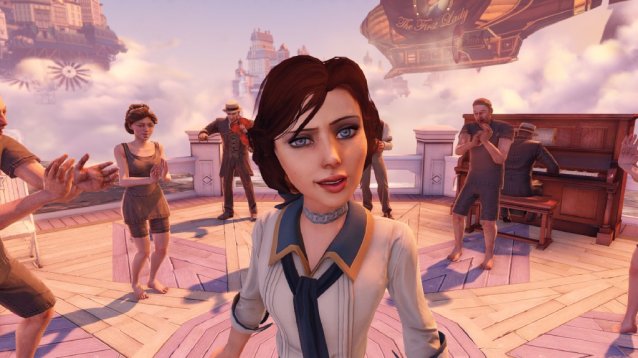
JB: How much interaction did you have with Troy Baker during the recording of the dialogue?
CD: We were together all of the time. Troy and I would usually fly on the same flight to Boston. We’d stay, not the same hotel room (laughs)…but at the same hotel. We’d have breakfast together and we’d ride in a cab to the recording studio, and then we’d record all day, and then us and some people would go out to dinner afterwards. Troy and I were kind of attached at the hip throughout our trips to Boston and our recordings in L.A. as well. So, I had a lot of interaction with him and I completely owe a huge part of my landing the role of Elizabeth to Troy because he really spent hours with me, educating me on the gaming industry, the technical aspects of voice over in a game and what he thought about Bioshock and why it was different and what it was trying to accomplish. He really was a mentor to me throughout the last couple of years. I’m very grateful to him for all he has done for me.
JB: Most times, you see a voice over artist isolated, working alone in a booth and that’s why I was curious if you and Troy had a good deal of interaction because, I thought, it certainly showed through in your performances.
CD: Yeah, I think you’re right on point about that. Usually, you don’t have anyone to interact with. Occasionally, you do group recordings where you are in a room recording with other people but, you’re right, most sessions you are alone. But being with Troy so much, I think that’s why so many of those narrative scenes you feel that connection between Booker and Elizabeth because Troy and I were in the same room, feeding off of each other. I think it’s very important to get that connection verses me recording it separately and him recording it separately.
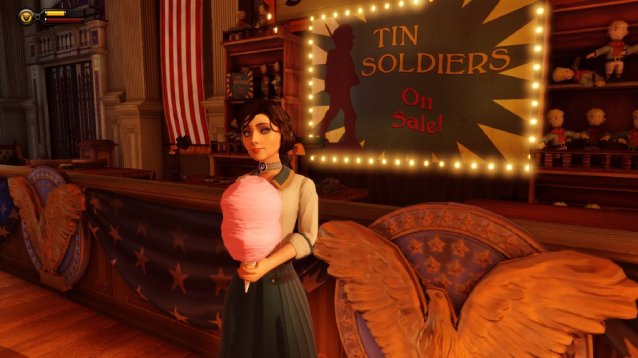
JB: Many female gamers thought, or desperately wanted, Elizabeth to be a playable character. Do you think that’s something that could have worked or should have been attempted? Why or why not?
CD: I think that it is so not my place to second guess the team at Irrational and Ken. I think that what they did (with Elizabeth as an AI companion/helper) had never been done before. I mean, if you had Elizabeth as a playable character, it wouldn’t have been as groundbreaking. A companion character like Elizabeth is rare, someone that helps you but doesn’t get in your way and she’s not nagging you, and you have the narrative and this connection, I really think that was done on a level that had never been done in the gaming industry before.
All of that groundbreaking stuff wouldn’t have happened if she was a playable character, so I think that the way that she worked and everything that went into her from a technological standpoint, it’s waaay more bad ass that she was this AI that was a companion character. From a narrative standpoint, it was cooler the way that she worked and was built.
I don’t know—could she have worked as a playable character? I’m sure she could have, but I think she’s awesome the way that she is.
JB: What do you think about playing an important role, not just in the Bioshock universe, but as a representative for women in games?
CD: It’s amazing. I am all about, and this a 1990’s throwback, I’m all about Girl Power! I love that women look to me as a positive role model in the gaming industry. I think it sucks that in this industry if you’re a girl gamer people immediately think that if you are wearing a Bioshock Infinite t-shirt it must be your boyfriend’s. Whatever. Girls in gaming are just as passionate, just as enthusiastic and just as skilled as the men are.
So, I think getting that attention and being a positive role model is phenomenal and it touches me that women in this industry look at me that way because, well, that’s a pretty damn cool thing to be!
JB: What are your thoughts on some of Columbia’s seedier elements or tougher issues (i.e. racism, religious autocracy, etc.)? Do you think those issues are something a video game can effectively address?
CD: Definitely. The fact that you’re even asking me this question gives credence to the fact that those elements in the game are effectively hitting home with the audience and the players. The fact that you are even able to recognize that and talk about that, it creates a dialogue I think that shows it is serving its purpose.
I don’t know what Ken’s particular vision was there, so I don’t want to speak for him but, for me, I think the effectiveness is to create a dialogue about those issues which it is certainly doing. Racism is still a part of our society, unfortunately, and while we may no longer have slavery in this country, other types of racism do exist. And globally, that problem exists in the real world, in everyday life, and it’s up to us, in the real world, to try and alleviate that problem as best we can.
This concludes part one of our interview with Courtnee Draper, stay tuned tomorrow for part two!
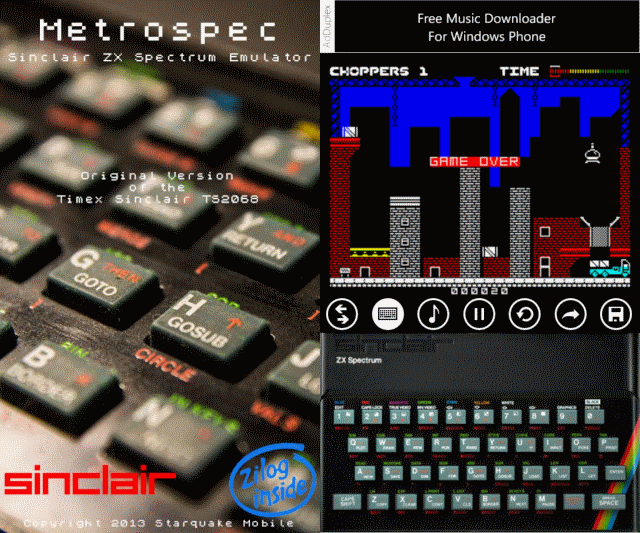

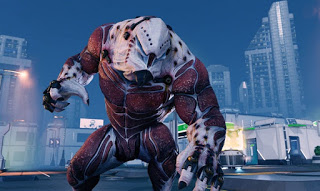
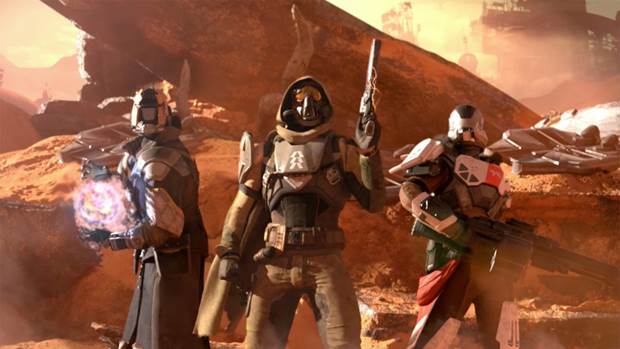
 Critic Review: Naild
Critic Review: Naild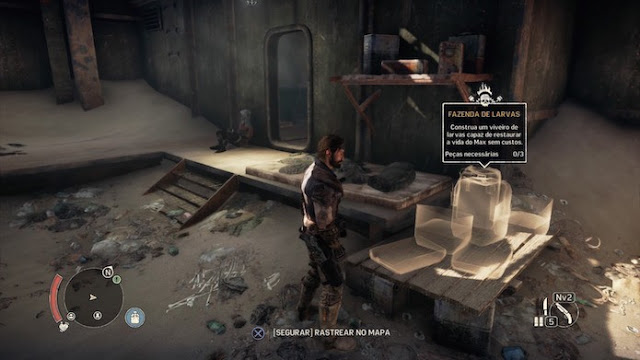 Mad Max: Upgrade / enhance Max Ability, Strength
Mad Max: Upgrade / enhance Max Ability, Strength Mortal Kombat X Guide: How to Play Johnny Cage
Mortal Kombat X Guide: How to Play Johnny Cage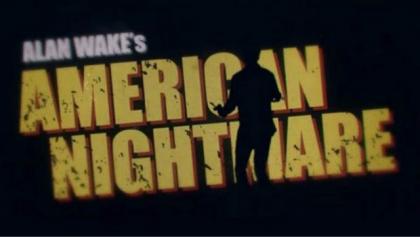 Alan Wake's American Nightmare Achievements List
Alan Wake's American Nightmare Achievements List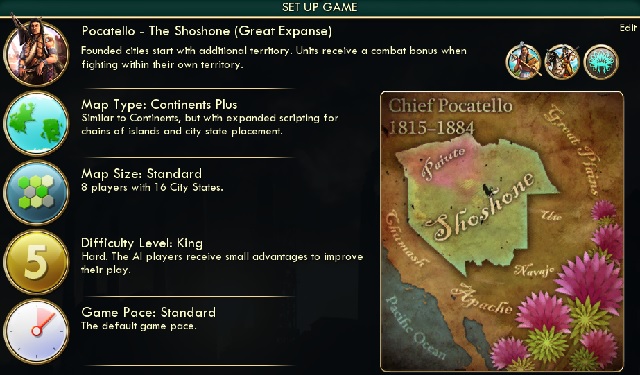 5 Ways To Keep Civilization 5 Interesting While You Wait For Beyond Earth
5 Ways To Keep Civilization 5 Interesting While You Wait For Beyond Earth